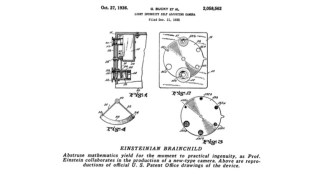Tech
Sign up for our newsletter
We summarize the week's scientific breakthroughs every Thursday.
-
 Tech
TechEinstein invents automatic camera
Einstein invents fridges,cameras and clothing.
By Science News -
 Tech
TechGrowing need for space trash collectors
On April 2, for the fifth time in less than three years, the International Space Station fired its engines to dodge a piece of orbital debris that appeared on a collision path. Other spacecraft also regularly scoot out of the way of rocket and satellite debris. Such evasive action will be needed increasingly frequently, a new study finds.
By Janet Raloff -
 Tech
TechSparing the rare earths
Potential shortages of useful metals inspire scientists to seek alternatives for magnet technologies
By Devin Powell -
 Tech
TechComputers get under our skin
Epidermal devices offer new potential to integrate electronics into the body.
-
 Tech
TechCracked sewers bleed fecal germs
Studies follow leaks into waterways and drinking supplies.
By Janet Raloff -
 Tech
TechAirports’ leaden fallout may taint some kids
People who live below the flight path of piston-engine aircraft — or downwind of airports serving such small planes — are exposed to lead from aviation fuel. A new study now links an airport’s proximity to somewhat elevated blood-lead levels in children from area homes.
By Janet Raloff -
 Tech
TechSome comfort about broken CFLs
My night-owl daughter woke me in a panic at around 2 a.m., a couple of weeks back. While swatting at a fly, she’d just broken the compact fluorescent light illuminating her closet. Having heard me warn endlessly of how we should be careful in handling these bulbs — since they contain mercury — she wanted to know what kind of damage control was called for. I only wish I knew then what I do now.
By Janet Raloff -
 Tech
TechBatteries not included
Researchers have developed a sensor that, when flexed, generates enough charge to send wireless signals.
-
 Tech
TechNew technique spins superlong nanowires
Made from any number of materials, fibers are millionths of a millimeter across and kilometers long.
-
 Tech
TechSocial Networks
Power networks in Congress, Twitter’s crystal ball and iPhone contagion in news from an MIT workshop on information in social media.
By Science News -
 Tech
TechInformation flow can reveal dirty deeds
An analysis of Enron e-mails reveals that corrupt networks have a distinctive shape.
-
 Tech
TechNuclear energy: As Germany goes…
The German government surprised many energy analysts May 30, with its pledge to phase out use of nuclear power. What makes the announcement particularly noteworthy is that this government is not offering to walk away from a bit player. Nuclear power currently supplies almost one-quarter of that nation’s electrical energy — more than its share in the United States.
By Janet Raloff